MO Touring: Building A Lightweight Adventure Bike

Adventure touring in a small package? Witness the Kawasaki KLX300 ADV.
Maybe I’ve been hanging out with Managing Editor Ryan Adams too much. After more than 30 years of riding almost exclusively on the street, I’ve been bitten by the off-road bug. (Having a 14 year-old daughter who asked me to teach her to ride dirt bikes played a big part, too.) However, I don’t want to just drive to the desert, do daylong dirt rides, load the bikes in the truck, and drive home. I want to travel, too. Adventure touring has tickled my fancy.
I started backpacking when I was a kid, spending time on the Appalachian Trail, the Sierra Crest, and even a trip horse packing in Montana. In my 20s, I took an Outward Bound course in North Carolina and, a few years later, packed my belongings on my first motorcycle for a three-month, 11,000 mile trip across the country. Except for the occasional car-camping weekend, most of that stuff stopped during the childrearing years. And now, I find myself up late at night looking at maps of Backcountry Discovery Routes, thinking that maybe I’m not too old to pursue solitude in the mountains even though my knees, after decades of running, are dropping hints that my dreams of hiking portions of the Pacific Crest Trail after I retire may be out of reach.
All of which brings me to the fact that a couple of weeks ago I found myself in the local Kawasaki dealership signing the paperwork to buy MO’s long-term KLX300. You see, I’ve got this crazy idea that I want to build a lightweight adventure touring bike. As an adventure touring motorcycle, the little KLX has a lot going against it: small tank, low top speed, and no creature comforts. On the other hand, it’s light, easy to pick up (I fall down a lot in the dirt), and it’s dead simple to ride in the dirt (something I need given my relative lack of experience off-roading). Also, there’s something really charming about the bike’s pluckiness. It took the abuse meted out on it as a test bike and came back for more.
Showdown: 2021 Honda CRF300L Vs 2021 Kawasaki KLX300
So, it seems like a good choice for me.
Protection
The first things I bought for the KLX were to protect it from the abuse associated with trail riding. Since I’d watched Sean Alexander hole a Super Ténéré’s case on rocks a few years back while we were many miles from the nearest paved road, I knew I wanted a skid plate. Unfortunately, there aren’t many options for the 2021+ KLX300. Of the basically two options I found, I went with the $178 Emperor Racing Heavy Duty Skid Plate KLX-1655, mainly because it looked beefy as hell, had countersunk bolts, and unlike the other option, had slots to allow a smidge of airflow. Yes, I know the KLX is liquid cooled, but that was my reasoning nonetheless. Mounting the skid plate took about a half hour, and I smile to myself every time I hear a rock ricochet off of it.
After experiencing a few broken levers on both the KLX300 and the CRF125F my daughter was riding, I knew the next item installed would be a set of handguards. Of the wide variety of options available, I chose Acerbis Rally Pro Handguards ($100) because I’d read on forums that they fit fairly easily to the KLX stock bar. However, it did require that I remove the internal bar weights to accommodate the mounting hardware. My rotary tool made quick work of the spot welds, and a bolt extractor pulled the weight from its lair. After about an hour’s work, the job was finished.
The next piece of equipment was not quite an impulse buy, but it was prompted by Ryan’s review of Doubletake Mirrors in which he described them as “a simple solution to off-road and adventure riders looking for robust mirrors that can be easily tucked out of the way when the pavement falls into the rearview.” Since I use my mirrors quite a bit to check on my daughter when we are riding, I knew I wanted mirrors that could withstand hitting the ground (repeatedly). Get the same Doubletake setup that I bought here for $138
Travel Worthy
Kawasaki’s engineers didn’t design the KLX300 with long-distance travel in mind. In fact, what I’m attempting with this project is kind of crazy, but nevertheless, a few simple modifications go a long way towards increasing the bike’s utility over time.
First and foremost, I needed more range out of a tank of gasoline. Even at the low speeds I’ll be traveling when riding off road, a mere two gallons of gas isn’t going to cut it with the average mpg being about 58, resulting in a calculated range of 116 miles. At the current stage of the aftermarket’s development cycle for the little KLX, there is only one option for a larger tank that I could find. The $392 IMS 2.7 Gallon Fuel Tank is pretty spendy, but I had no choice. While 0.7 gallons doesn’t sound like much of a change, it translates into 35% more capacity, which feels like a much better use of funds.
The biggest chore of installing the tank was getting all the gas out of the OEM one. Really. Otherwise, the only real challenge was the fact that the stock bodywork strained to get the bolt holes to line up, a feeling similar to that of trying to button my jeans before I lost 40 pounds last year. Ultimately, everything fit – if snugly – in place.
Since I’m fairly certain that, occasionally, even the increased tank capacity won’t deliver enough range, I purchased a 1 gallon Giant Loop Armadillo Bag to temporarily transport additional fuel for longer stretches of backcountry. As a result, I also needed a place to mount it. A Precision Motorcycle Racks KLX300 Enduro Series was the hot ticket at a reasonable $94. The installation was dead simple, and the only thing I would change is swapping the plastic spacers included with the kit for some sturdier aluminum tubing (if I can find it) since the plastic distorted a little when I accidentally over torqued one bolt.
Finally, I needed to set up a way to power my phone for the long haul. Using a Tusk Accessory Dash Panel ($30) as the base, I mounted a $14 USB-C Charger Socket. While it’s directly plugged into the battery for now, I plan to install a relay to make it switchable when I have time. I followed up with an SP Connect Mirror Mount Pro ($50) (to mount on the handlebar’s crossbar) and stole the $30 SP Connect Anti Vibration Module and $60 SP Connect Wireless Charging Module from my 790 Duke. Ultimately, I plan on replacing the phone with a dedicated GPS, but the money’s not there at the moment.
Luggage
The ideal luggage system for my project would be easy to install and remove – after all, I’ll want to strip down the bike for dirt riding with my daughter. The luggage also needs to be modular, allowing for different sized bags on different length trips. Of the brands I looked at, Wolfman Motorcycle Luggage appealed to me the most. Although I liked the previous generation of Wolfman Luggage (see my review of the Blackhawk Tank Bag), I’m impressed with the step up in quality with the 2020 revamp of the entire model line that incorporated radio frequency welding in all of the seams, making every bag 100% waterproof without the need for liners or covers.
The Wolfman E-Base ($160) mounts to the bike via four webbing straps and provides multiple mounting points for just about everything I could imagine carrying. To that, a pair of 6-liter Small Rollie Bags ($80 ea.) were mounted. These easily held my tent (over the exhaust) and my sleeping bag and pad (on the left side) along with a few small items to fill up the space. In the center between the bags and covering the rack, a 12-liter Medium Rollie Bag ($95) held pretty much everything else (clothes, first aid kit, tools, stove, etc.). Wolfman also offers 20-liter Rollies for more carrying capacity. Rounding out my Wolfman gear is a Water Bottle Holster ($45) with an added 48 oz. Nalgene bottle mounted on top of the Medium Rollie.
I’m not going to go into too much detail here because I’m planning on a full review of this versatile luggage system in a couple of weeks, but I want to leave two important bits of information. First, I’ll reiterate, all Wolfman bags are 100% waterproof. This new material is extremely tough, withstanding several crashes my first weekend out and even protecting my KLX’s bodywork as I dragged it off of rocks to move it to a better location for picking up. Second, Wolfman Motorcycle Luggage is an enthusiast-run company that designs all of its gear in its Colorado headquarters. The level of versatility along with the quality of the construction shows that the gear is created by – and for – enthusiasts.
A Test Run
A couple weekends ago, I took the Lightweight ADV Project out for a 500-mile two-day shakedown run to Kennedy Meadows for some camping and off-road fun, and though not without some teething pains, it was an unqualified success. To simulate adventure travel, most of my dirt riding was done with the bike fully loaded with gear. Much fun was had and several lessons were learned. As a result, I have both trimmed and added to what I will carry with me on upcoming adventures. Additionally, I learned that in the future, I should try to cover long distances on as many two-lane highways as possible. While the little KLX can maintain 70-75mph on the freeway as long as there isn’t a significant headwind, having obese SUVs constantly blowing past at over 85mph gets to be a drag after a while. I think I’d rather go a little slower, ride a little further, and take the route with less traffic so that I don’t have to constantly watch my mirrors.
What’s next for my Kawasaki KLX300 ADV? I’m not sure, but I know it will be fun. Ryan and I are tossing around some ideas for places to go for a proper adventure tour. You can be sure that we’ll write about it – maybe even shoot a video – when we firm up the plans.
We are committed to finding, researching, and recommending the best products. We earn commissions from purchases you make using the retail links in our product reviews. Learn more about how this works.
Become a Motorcycle.com insider. Get the latest motorcycle news first by subscribing to our newsletter here.

Like most of the best happenings in his life, Evans stumbled into his motojournalism career. While on his way to a planned life in academia, he applied for a job at a motorcycle magazine, thinking he’d get the opportunity to write some freelance articles. Instead, he was offered a full-time job in which he discovered he could actually get paid to ride other people’s motorcycles – and he’s never looked back. Over the 25 years he’s been in the motorcycle industry, Evans has written two books, 101 Sportbike Performance Projects and How to Modify Your Metric Cruiser, and has ridden just about every production motorcycle manufactured. Evans has a deep love of motorcycles and believes they are a force for good in the world.
More by Evans Brasfield



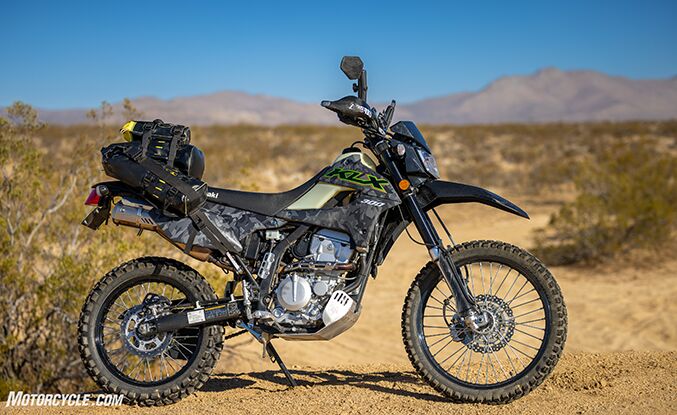
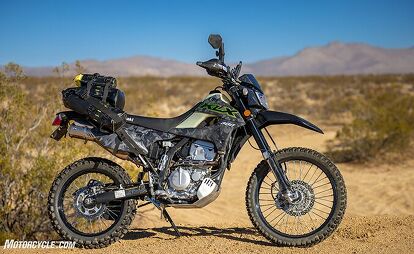































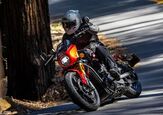
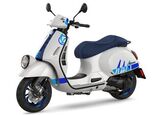
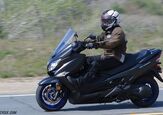
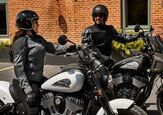

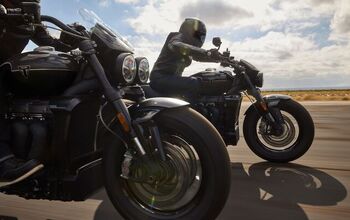
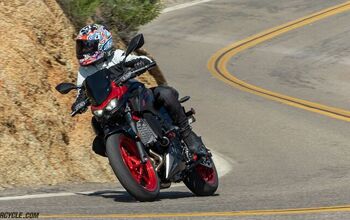
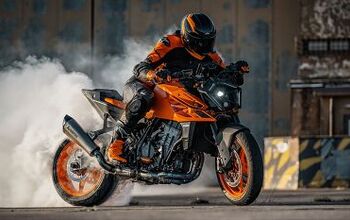
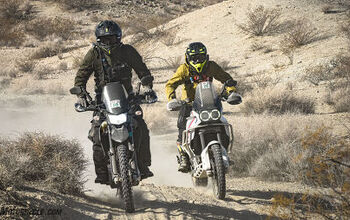
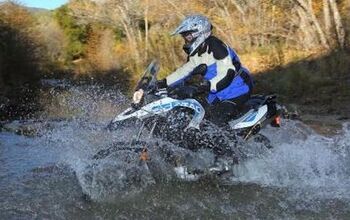
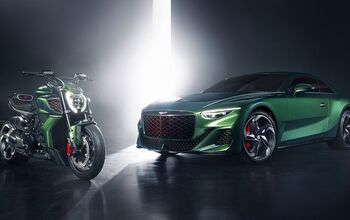
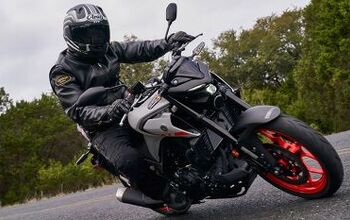
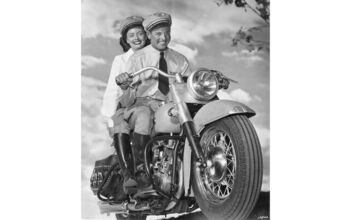
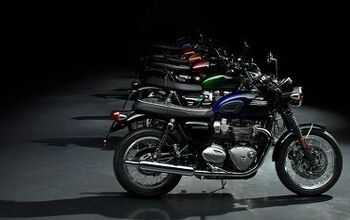
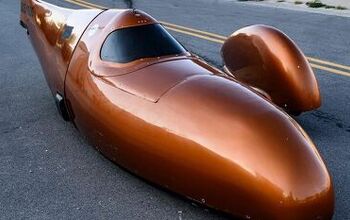
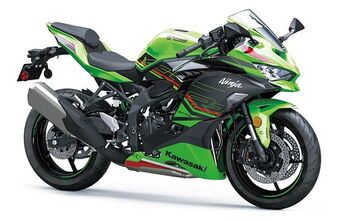


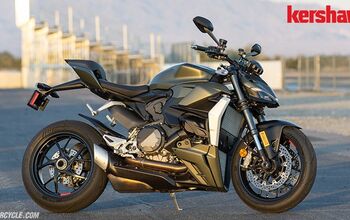
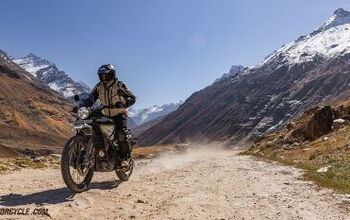
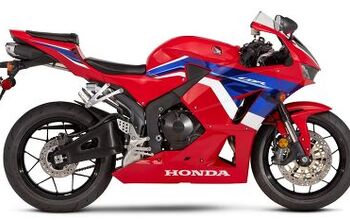
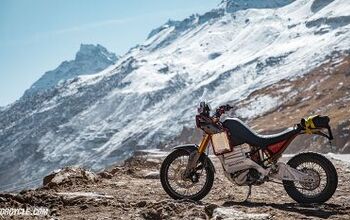
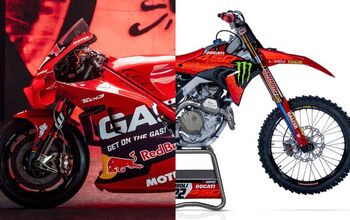
Comments
Join the conversation
This is to 'adventure bikes' what a Jeep Wrangler is to and Escalade.
Well done!
A KLX will slow down with just a 170# rider when going up hills or into the wind. Mine has been down to 50mph climbing a medium grade hill at 5,000’ elevation with just a rider aboard. No way this would make a good ADV for a fatty and luggage. Rather unsafe in this day and age. I put 16,000 miles on a KLX and would upgrade to a bigger bike if I had ADV touring aspirations. Otherwise, it’s a great bike for commuting and messing around off-road.